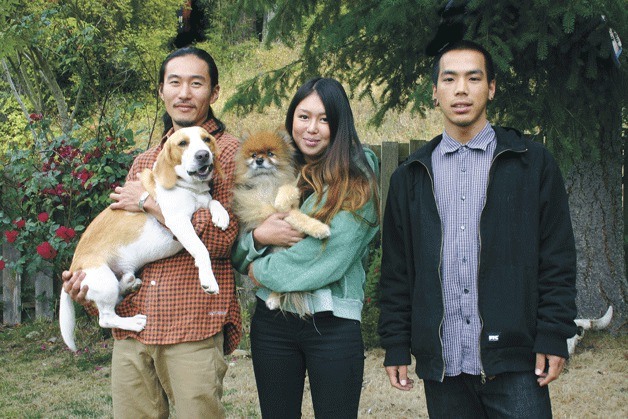FREELAND — For three Japanese natives, Freeland is a long midway in an even longer journey.
More than 6,000 miles and two months of traveling lay between their former homes in Fukushima Prefecture and what has become their new summer home near Holmes Harbor. Language barriers, cultural differences, financial hardship and dealing with loss were still to come.
Tatsumasa Aiura, Eriko Shirai and Kosuke Otsuki have been temporary Freeland residents since June. They are part of a castaway group of 10 friends and family members from Fukushima, Japan who survived the magnitude 9.0 earthquake on March 11 but have since fled the country amid fears of fallout from the failure of the nearby nuclear power plant.
Aiura and Shirai were entertaining a few American guests at a mall when the earthquake hit.
“I was shopping. I watched the broken building and broken windows,” Aiura said, waving his upright hands back and forth like a shaking building.
Otsuki, 20, was home alone in Koriyama. Though he speaks just a little English, he didn’t need a translator to describe the quake.
“Scary,” Otsuki said.
A terrifying event was made worse by the weather. An unusual snowstorm hit Koriyama that Friday in March. As Aiura and Shirai fled the mall with their guests, they were blinded by the snow and could only feel what was happening in the cold.
“Everybody thought it was the end of the world,” Aiura said.
The blizzard lasted about five minutes, and after, the skies cleared and they took in the destruction around them.
Aiura and Shirai didn’t have just themselves to think about. Their American guests, Ed Gorski and Ken Oak, are an indie folk-rock group from California who were brought to Japan by Shirai’s mother, Yuko, who runs a tour company.
They decided to go back home to Koriyama to get other family and friends and head farther west, away from the disaster, to Nikko.
Once in their motel room, they watched the news. While no one from their families was killed, the images of wrecked buildings and devastation was overwhelming.
Otsuki, in his limited English, described his attitude toward his former home.
“Dangerous,” he said.
Aiura pulled out his iPhone and displayed pictures of radiation check stations around Koriyama. He said the checkpoints are outside of electronics stores, the grocery market and the malls.
“It’s crazy,” Aiura said. “It’s unusual.”
Through a few degrees of separation, Aiura, Shirai and Otsuki made their way to Whidbey Island with the clothes they were wearing and a suitcase each.
Otsuki knows Shirai through her brother, and they’ve been best friends since childhood.
Aiura, 33, was a dentist in Koriyama, about 50 miles west of the tsunami-stricken nuclear power plant. He worked at the dental offices of Shirai’s father.
The trio found their way to Whidbey thanks to Yuko, Shirai’s mother. She had visited Greenbank resident Diane Watts a few months before the earthquake.
Before the disaster, Yuko Shirai had asked if she could use Watts’ guest house for her tour business. Now, with the group leaving northern Japan for the supposed safety of Tokyo, she emailed Watts again about using the Freeland home — this time as a refuge from the aftershocks, devastation and radiation that lingered in Japan.
Watts agreed to host them, and they arrived on Whidbey Island at the start of summer.
There were 10 Japanese visitors staying in Watts’ four bedroom home until August. Then, everyone but Aiura, Shirai and Otsuki received tourist visas to New Zealand and moved there to begin the process of obtaining year-long visas after they found work just outside of Auckland.
The three Fukushima natives stayed behind, however, because of their beloved dogs — a rambunctious beagle named Peta and a 13-year-old tiny Shiba Inu named Ren. Getting the official OK to immigrate with their pets into New Zealand has stalled their departure.
Their hope, once the dogs can get clearance to accompany the trio, is to move to New Zealand and begin building a new life. Aiura’s dental practice won’t go with him, so he’s relying on the younger members of their non-nuclear family to work.
“Young people, it’s very easy to get working visas,” he said, laughing. “Old people like me, it’s very hard. I need young people to work to help me.”
Until then, they are slowly exploring the Northwest.
That’s posed a few challenges, too. All three of them burst out laughing when asked what they do for fun in Freeland.
Before they leave — they hope to embark sometime in November — they have a to-do list almost as long as their journey to Whidbey. Visiting Mount Rainier and Mount Baker. Camping at Fort Ebey State Park. Walking around Seattle.
Still, Watts said they have been kept plenty busy by guests from all over Whidbey and Puget Sound who want to help them.
And Shirai is a fantastic chef, Watts added, and cooks three meals a day for however many guests they have, whether it’s just three or a dozen.
“People are very sweet,” Shirai said.
“I love it here,” Aiura said. “Every day, good things happen.”



